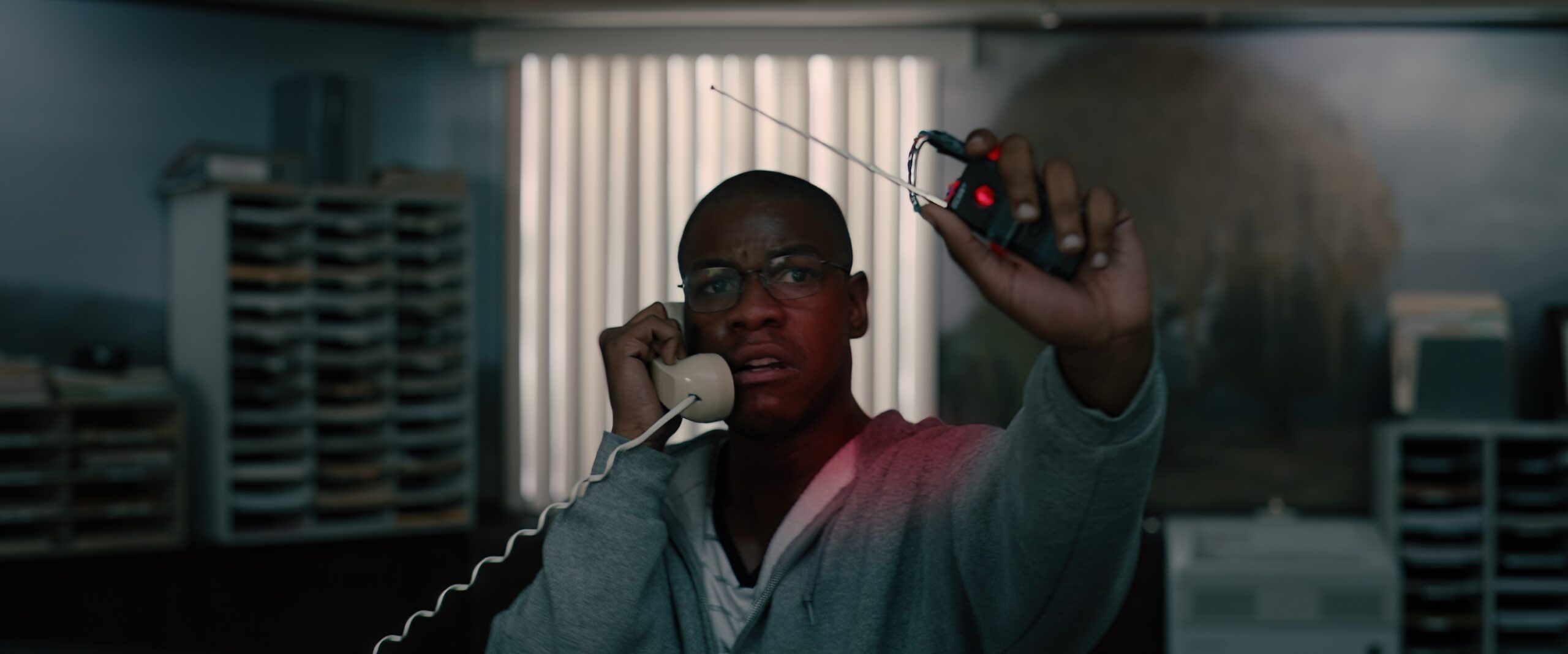
Writer-director Abi Damaris Corbin was driving when a text from her manager, Max Goldfarb, alerted her to “They Didn’t Have to Kill Him” — a 2018Task & Purpose articleby Aaron Gell on Marine veteran Brian Brown-Easley and his disastrous 2017 attempt to rob a suburban Atlanta Wells Fargo branch after the Department of Veteran Affairs cut off his disability payments.
Corbin pulled over and read the lengthy piece, held rapt by the unfolding tragedy of Brown-Easley’s life. Her father served in the Vietnam War, and the story resonated with her.
Though Corbin didn’t know it yet, that article would move her to transform Brown-Easley’s story into her first feature, after making a number of short films. Now called“Breaking,”the film — starring John Boyega as Brown-Easley, Nicole Beharie and Selenis Leyva as his hostages, Connie Britton as a television station executive, and the late Michael K. Williams in his final role as a police negotiator — premiered in January at the Sundance Film Festival and screened as the Centerpiece selection of April’s SFFilm Festival as “892.”
Review: John Boyega channels Denzel Washington as veteran in crisis in ‘Breaking’

“My heart just broke overnight,” Corbin told The Chronicle of her first reaction to the article during a conversation at the Clift Royal Sonesta Hotel in San Francisco during her visit to the film festival. “Thinking about Brian’s daughter, his wife and thinking about my dad. I saw a lot of his struggle reflected in Brian’s story. And it helped me understand a lot of my time at the VA with my dad better.
“I knew if it gave me that level of empathy and compassion, it would do so for others. I wanted to be really honest with the story.”
To write the screenplay with her, Corbin turned to British actor, playwright and theater director Kwame Kwei-Armah. Goldfarb introduced them, and the pair hit it off when they met over dinner in Los Angeles. The collaboration presented a geographical challenge: While Corbin remained in California, Kwei-Armah returned to his home in London. Working over FaceTime, they would start at noon Pacific time and put in eight-hour days, concluding when it was 3 a.m. in England.
Kwei-Armah described their method as, “Write, type, recite.”

“Abi这么漂亮的眼睛,她就像,‘No, that’s not quite right,’ ” he said in a recent phone call. “We would try things three or four times, always refining. She investigates really hard but is magnificently collaborative.”
One thing that the partners were set on accomplishing as they worked on the screenplay was not just to depict the events of the robbery, and the days leading up to it, but also to portray Brown-Easley as fully as possible. They did not want to simply show a man driven to a desperate act by mental illness and indifferent government bureaucracy. With that in mind, Corbin met with Brown-Easley’s wife and daughter to get a sense of who he was in the eyes of those closest to him.
“Brian had a sense of humor,” Corbin said. “He was a loved man who deeply loved. And that love permeated everything he did.”
As for Brown-Easley’s motive in entering the bank that day and demanding only $892, the exact amount of his missing disability check, Kwei-Armah saw it as being about far more than the money.
“I felt he was simply saying, ‘I need to be seen. I need you to see me for who I am. The system is not and is breaking me with every appeal that I make. I am not heard, nor am I seen,’ ” he said.

Corbin and Kwei-Armah spent time in Atlanta, retracing Brown-Easley’s steps. They visited the bank, along with the hotel room where he lived that he was about to lose for lack of funds. They listened to transcripts that described the unfolding events as Brown-Easley holed up in the bank. One draft of the screenplay was based on those transcripts, providing a reference for Corbin and Kwei-Armah as they worked on subsequent drafts that dramatized the robbery.
Ultimately, “Breaking” was filmed in Los Angeles, except for establishing images shot in Georgia, after it proved challenging to find a crew with so many projects already shooting in Atlanta. The production hit one more snag when it lost its original leading man, “The Last Black Man in San Francisco” star Jonathan Majors, due to scheduling conflicts.

Boyega’s involvement seems almost like kismet. Kwei-Armah gave the future “Star Wars” star his first job at London’s Tricycle Theatre, and it was Boyega’s roles in three plays there, including Kwei-Armah’s play “Seize the Day,” that led to his screen debut in the 2011 horror comedy “Attack the Block.”
“I’m a firm believer that the person who’s supposed to be in the room winds up there,” said Corbin. “The first day John Boyega was on set was the four-year anniversary of the day Brian walked into that bank.
“We had a moment of silence for Brian, and it felt like everything just faded away. … When John first stepped on camera, it was like destiny colliding. It was beautiful. I’m really grateful for John. He’s a generational talent.”
“Breaking”(PG-13) opens in Bay Area theaters starting Friday, Aug. 26.
